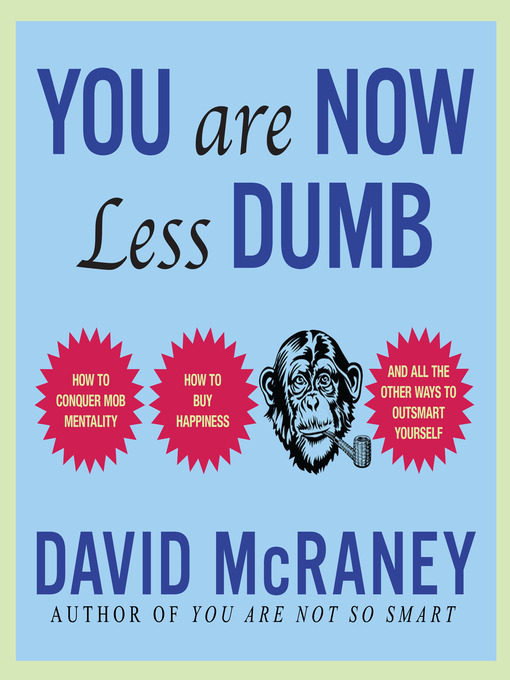You are here
Sat, 09/02/2017 - 19:52 — nibs
| Size | Seeds | Peers | Completed |
|---|---|---|---|
| 125.97 MiB | 1 | 0 | 221 |
| Flag | Count |
|---|---|
| Essential content | 1 |

.
A mix of popular psychology and trivia, You Are Now Less Dumb is grounded in the idea that we all believe ourselves to be objective observers of reality--except we’re not. But that’s okay, because our delusions keep us sane.
Expanding on this premise, McRaney provides eye-opening analyses of seventeen ways we fool ourselves every day, including:
- Enclothed Cognition (the clothes you wear change your behavior and influence your mental abilities)
- The Benjamin Franklin Effect (how you grow to like people for whom you do nice things and hate the people you harm)
- Deindividuation (Despite our best intentions, we practically disappear when subsumed by a mob mentality)
- The Misattribution of Arousal (Environmental factors have a greater effect on our emotional arousal than the person right in front of us)
- Sunk Cost Fallacy (We will engage in something we don’t enjoy just to make the time or money already invested “worth it”)
- McRaney also reveals the true price of happiness, and how to avoid falling for our own lies
_______________________________________
Another ConCen exclusive, chapterized and re-encoded for minimum size with maximum quality.
This audio book is the sequel of You Are Not So Smart, available here.
- Log in to post comments

Comments
Breakdown of each chapter
Introduction: Self Delusion
The misconception: You are a being of logic & reason
The truth: You are a being capable of logic & reason who falls short of that ideal in predictable ways
1. Narrative Bias
The misconception: You make sense of life through rational contemplation
The truth: You make sense of life through narrative
2. The Common Belief Fallacy
The misconception: The larger the consensus, the more likely it is correct
The truth: A belief is not more likely to be accurate just because many people share it
3. The Benjamin Franklin Effect
The misconception: You do nice things for the people you like and bad things to the people you hate
The truth: You grow to like people for whom you do nice things and hate people you harm
4. The Post Hoc Fallacy
The misconception: You notice when effect doesn't follow cause
The truth: You find it especially difficult to believe a sequence of events means nothing
5. The Halo Effect
The misconception: You objectively appraise the individual attributes of other people
The truth: You judge specific qualities of others based on your global evaluation of their character and appearance
6. Ego Depletion
The misconception: Willpower is just a metaphor
The truth: Willpower is a finite resource
7. The Misattribution of Arousal
The misconception: You always know why you feel the way you feel
The truth: You can experience emotional states without knowing why, even if you believe you can pinpoint the source
8. The Illusion of External Agency
The misconception: You always know when you are making the best of things
The truth: You often give credit to outside sources for providing your optimism
9. The Backfire Effect
The misconception: You alter your opinions and incorporate the new information into your thinking after your beliefs are challenged with facts
The truth: When your deepest convictions are challenged by contradictory evidence, your beliefs get stronger
10. Pluralistic Ignorance
The misconception: Many of your private beliefs are in disagreement with what most people think
The truth: On certain issues, the majority of the people believe that the majority of the people in a group believe what, in truth, the minority of the members believe
11. The No True Scotsman Fallacy
The misconception: You honestly define that which you hold dear
The truth: You will shift your definitions to protect your ideologies
12. The Illusion of Asymmetric Insight
The misconception: You celebrate diversity and respect others' points of view
The truth: You are driven to create and form groups and then believe others are wrong just because they are others
13. Enclothed Cognition
The misconception: Clothes as everyday objects are just fabrics for protection and decoration of the body
The truth: The clothes you wear change your behavior, and can either add or subtract from your mental abilities
14. Deindividuation
The misconception: People who riot and loot are scum who are just looking for an excuse to steal and be violent
The truth: Under the right conditions you are prone to losing your individuality and becoming absorbed into a hive mind
15. The Sunk Cost Fallacy
The misconception: You make rational decisions based on the future value of objects, investments and experiences
The truth: Your decisions are tainted by the emotional investments you accumulate, and the more you invest in something, the harder it becomes to abandon it
16. The Overjustification Effect
The misconception: There is nothing better in the world than getting paid to do what you love
The truth: Getting paid for doing what you already enjoy will sometimes cause your love for the task to wane, because you attribute your motivation as coming from the reward, not your internal feelings
17. The Self-Enhancement Bias
The misconception: You set attainable goals based on a realistic evaluation of your strengths and weaknesses
The truth: You protect unrealistic attitudes about your abilities in order to stay sane and avoid despair